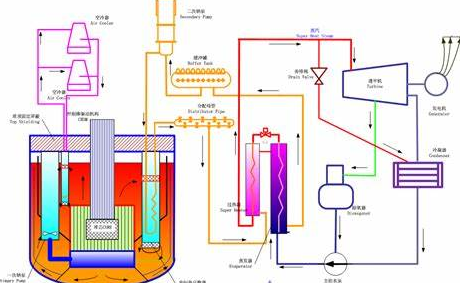Current situation and problems of nuclear power development in our country

3. Insufficient legislative and institutional safeguards for nuclear security
1. The nuclear safety legislation system is not sound
So far, China has not established a sound, scientific and standardized nuclear security legislation system. [26] However, there are still many legislative gaps in the field of nuclear safety in China, and there are still gaps compared with some countries such as the United States, Japan, Germany and France in terms of nuclear safety facility supervision and nuclear material disposal. First, the basic law on nuclear safety is missing. The Atomic Energy Law, the basic law in the field of nuclear safety, has been in the works for more than 30 years, but has not been enacted. Second, despite the Nuclear Safety Law, there are still many problems with the law. Third, some regulations concerning nuclear safety are in urgent need of revision. On the one hand, the contents of some regulations overlap and cross, and need to be cleaned up; On the other hand, some regulations are too principled and lack operability. Moreover, the purpose of some legislation is not clear about nuclear security, which is inconsistent with the international legislative trend. In addition, the lack of safeguards for the public's right to know and participate may harm people's well-being.
2. There are some outstanding problems in the nuclear safety regime
First of all, there are many nuclear safety regulatory agencies, and there is a lack of unified regulatory authorities and procedures. For example, the nuclear Safety Bureau of the Ministry of Environmental Protection is responsible for the safety of nuclear facilities, the health and public security department is responsible for the licensing of radioactive devices, and the storage and disposal of radioactive solid waste is responsible for the "administrative department of environmental protection under The State Council." Secondly, in the EIA of nuclear power projects, there are structural defects such as lack of planning EIA and low level of public participation, and lack of environmental quality standards in the construction and supervision of nuclear power plants, [27] resulting in some indicators that should be measured being ignored due to lack of provisions in legislation. Third, there are many defects in the radioactive waste management system. For example, there are no provisions on measures to be taken after the closure of radioactive waste disposal facilities, measures to prevent and control the transboundary transfer of radioactive waste, and there are no provisions on public rights and interests in radioactive waste management. Fourth, there are many omissions in the establishment of a nuclear safety culture, the lack of a systematic education system, and the lack of mechanisms to encourage citizens to raise awareness of nuclear safety. In August 2018, The General Office of the State Council issued the Guiding Opinions on Strengthening the Standardization of Nuclear Power, proposing to rank among the top nuclear power standardization powers by 2027. It is a really wise choice to solve the security problem before developing.
3. Insufficient protection of social and public rights
At present, the construction of nuclear power plants around the country is enforced by the state, in the site selection, operating conditions and other safety evaluation, the public has almost no say, and China has not yet built a nuclear power low-level waste disposal site in the true sense. [28] In fact, nuclear power companies, as market players, pursue simple commercial interests, which are completely different from national defense and military industry. China's Nuclear Safety Law, while clarifying the safety obligations of various entities, does not make clear provisions on nuclear damage compensation, which is a major defect. As for liability for nuclear damage, there is almost no legislation in China, only the General Principles of the Civil Law and the Law on the Prevention and Control of Radioactive Pollution have made some general provisions, and the principles of determining liability for damage, the scope and amount of compensation, the statute of limitations and jurisdiction are not clear.
(4) Abandonment and phase-out of nuclear power is an international trend
1. An accident at a nuclear power plant will cause permanent damage
According to published reports, there have been 16 serious nuclear accidents around the world. Among them, the most serious was the 1986 explosion at the Chernobyl nuclear power plant in the former Soviet Union. The accident resulted in 93,000 deaths, 270,000 cancer cases, [29] 160,000 square kilometers of uninhabitable land, and direct economic damage of $358 billion, many times the total value of all nuclear power produced in the former Soviet Union. After the Fukushima nuclear accident in Japan, the 30km area around the nuclear power plant became a no-man's land, and about 200,000 refugees were homeless. As a result, the amount of third-party nuclear damage compensation paid has reached 4.7 trillion yen (about 39 billion US dollars), "the consequences are very serious, and the lessons are quite profound." [30]
- ABB
- General Electric
- EMERSON
- Honeywell
- HIMA
- ALSTOM
- Rolls-Royce
- MOTOROLA
- Rockwell
- Siemens
- Woodward
- YOKOGAWA
- FOXBORO
- KOLLMORGEN
- MOOG
- KB
- YAMAHA
- BENDER
- TEKTRONIX
- Westinghouse
- AMAT
- AB
- XYCOM
- Yaskawa
- B&R
- Schneider
- Kongsberg
- NI
- WATLOW
- ProSoft
- SEW
- ADVANCED
- Reliance
- TRICONEX
- METSO
- MAN
- Advantest
- STUDER
- KONGSBERG
- DANAHER MOTION
- Bently
- Galil
- EATON
- MOLEX
- DEIF
- B&W
- ZYGO
- Aerotech
- DANFOSS
- Beijer
- Moxa
- Rexroth
- Johnson
- WAGO
- TOSHIBA
- BMCM
- SMC
- HITACHI
- HIRSCHMANN
- Application field
- XP POWER
- CTI
- TRICON
- STOBER
- Thinklogical
- Horner Automation
- Meggitt
- Fanuc
- Baldor
- SHINKAWA
- Other Brands




































































































































